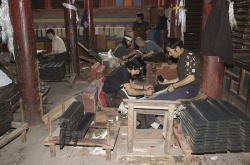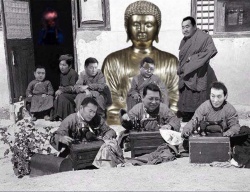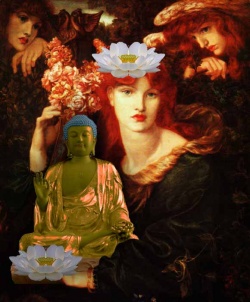Difference between revisions of "Derge"
(Created page with "thumb|250px| <poem> Derge (also Dêgê, Tibetan སྡེ་དགེ་, Wylie: sde dge) is a town in Dêgê County in {{...") |
|||
| (5 intermediate revisions by the same user not shown) | |||
| Line 1: | Line 1: | ||
| − | [[File:Derge_typography.jpg|thumb|250px|]] | + | [[File:Derge_typography.jpg|thumb|250px|]]<nomobile>{{DisplayImages|3679|4397}}</nomobile> |
| + | |||
| + | |||
| + | |||
| + | |||
| + | |||
<poem> | <poem> | ||
| − | [[Derge]] (also [[Dêgê]], Tibetan [[སྡེ་དགེ་]], Wylie: [[sde dge]]) is a town in [[Dêgê]] | + | [[Derge]] (also [[Dêgê]], [[Tibetan]] {{BigTibetan|[[སྡེ་དགེ་]]}}, [[Wylie]]: [[sde dge]]) is a town in [[Dêgê County]] in {{Wiki|Garzê Tibetan Autonomous Prefecture}} in {{Wiki|China}}'s {{Wiki|Sichuan}} province. |
| + | |||
| + | It was once the center of the {{Wiki|Derge Kingdom}} of {{Wiki|Kham}} or [[Eastern Tibet]]. | ||
History | History | ||
| + | |||
| + | [[sde dge]] | ||
| + | |||
| + | [[Derge]] - large {{Wiki|independent}} {{Wiki|kingdom}} in [[Kham]] that used to occupy the present-day counties of [[Jomda]], [[Derge]], [[Palyul]], and [[Sershul]]. [RY] | ||
| + | |||
| + | *The capital of [[Derge Kingdom]] which once ruled the whole northern [[Kham]] area. | ||
| + | |||
See also: {{Wiki|Kingdom of Derge}} | See also: {{Wiki|Kingdom of Derge}} | ||
| − | |||
| − | The town of [[Derge]] is famous for its three-storey printing house, or [[parkhang]], built in 1729, where [[Kangyur]], a collection of [[Buddhist]] | + | Historically, [[Derge]], which means "[[land of mercy]]" was one of the three {{Wiki|ancient}} centres of {{Wiki|Tibetan}} {{Wiki|culture}}, along with {{Wiki|Lhasa}} and Xiahe. |
| − | It has been estimated that the 217,000 blocks stored at Derge comprise 70% of the Tibetan literary heritage. | + | |
| − | The town also contains several historic Tibetan monasteries, notably the | + | [[Derge]] was formerly the seat of the [[kings]] of the {{Wiki|kingdom of Derge}}, whose 1300-year [[lineage]] was broken with the [[death]] of the last {{Wiki|male}} heir in the 1990s. |
| + | |||
| + | The {{Wiki|kingdom}} was an important industrial, [[religious]] and {{Wiki|political}} center in Eastern {{Wiki|Tibet}}. | ||
| + | |||
| + | In the early 20th century, the {{Wiki|kingdom}} fell into {{Wiki|political}} struggle between the final heirs to the [[throne]], [[Djembel Rinch'en]] and [[Doje Senkel]]. | ||
| + | |||
| + | The [[latter]], who had enjoyed the backing of the {{Wiki|Chinese}}, yielded the {{Wiki|kingdom}} to {{Wiki|China}} in 1908 in exchange for the ousting of his rival. | ||
| + | |||
| + | ''The palace of the [[Derge]] [[kings]] was subsequently converted into a school. | ||
| + | |||
| + | |||
| + | The town of [[Derge]] is famous for its three-storey [[printing house]], or [[parkhang]], built in 1729, where [[Kangyur]], a collection of [[Buddhist scriptures]] and [[Tengyur]], a [[collection of commentaries]], are still printed from wooden blocks. | ||
| + | |||
| + | It was established during the reign of [[Derge king]] [[Tenpa Tsering]]. | ||
| + | |||
| + | [[Derge]] produced artist like the [[Situ Panchen]] or the [[8th Tai Situpa]] who was a renowned [[buddhist master]] helped to revive the [[tibetan culture]], [[language]] and helped the [[King]] [[Tenpa Tsering]] to set up the [[Derge Parkhang]] or [[Derge printing house]]. | ||
| + | |||
| + | The [[printing house]], run by [[monks]], continues to use its {{Wiki|ancient}} [[techniques]] and uses no electricity. | ||
| + | |||
| + | The roof is used for drying the printed sheets. | ||
| + | |||
| + | It has been estimated that the 217,000 blocks stored at [[Derge]] comprise 70% of the [[Tibetan]] {{Wiki|literary}} heritage. | ||
| + | |||
| + | The town also contains several historic [[Tibetan monasteries]], notably the [[Palpung Monastery]], [[Gongchen Monastery]], [[Kathok Monastery]], {[[Palyul Monastery]], [[Shechen Monastery]] and [[Dzogchen Monastery]]. | ||
</poem> | </poem> | ||
{{W}} | {{W}} | ||
| − | [[Category: | + | |
| + | [[Category:Dergé]] | ||
Latest revision as of 18:00, 5 April 2016
Derge (also Dêgê, Tibetan སྡེ་དགེ་, Wylie: sde dge) is a town in Dêgê County in Garzê Tibetan Autonomous Prefecture in China's Sichuan province.
It was once the center of the Derge Kingdom of Kham or Eastern Tibet.
History
sde dge
Derge - large independent kingdom in Kham that used to occupy the present-day counties of Jomda, Derge, Palyul, and Sershul. [RY]
- The capital of Derge Kingdom which once ruled the whole northern Kham area.
See also: Kingdom of Derge
Historically, Derge, which means "land of mercy" was one of the three ancient centres of Tibetan culture, along with Lhasa and Xiahe.
Derge was formerly the seat of the kings of the kingdom of Derge, whose 1300-year lineage was broken with the death of the last male heir in the 1990s.
The kingdom was an important industrial, religious and political center in Eastern Tibet.
In the early 20th century, the kingdom fell into political struggle between the final heirs to the throne, Djembel Rinch'en and Doje Senkel.
The latter, who had enjoyed the backing of the Chinese, yielded the kingdom to China in 1908 in exchange for the ousting of his rival.
The palace of the Derge kings was subsequently converted into a school.
The town of Derge is famous for its three-storey printing house, or parkhang, built in 1729, where Kangyur, a collection of Buddhist scriptures and Tengyur, a collection of commentaries, are still printed from wooden blocks.
It was established during the reign of Derge king Tenpa Tsering.
Derge produced artist like the Situ Panchen or the 8th Tai Situpa who was a renowned buddhist master helped to revive the tibetan culture, language and helped the King Tenpa Tsering to set up the Derge Parkhang or Derge printing house.
The printing house, run by monks, continues to use its ancient techniques and uses no electricity.
The roof is used for drying the printed sheets.
It has been estimated that the 217,000 blocks stored at Derge comprise 70% of the Tibetan literary heritage.
The town also contains several historic Tibetan monasteries, notably the Palpung Monastery, Gongchen Monastery, Kathok Monastery, {Palyul Monastery, Shechen Monastery and Dzogchen Monastery.


